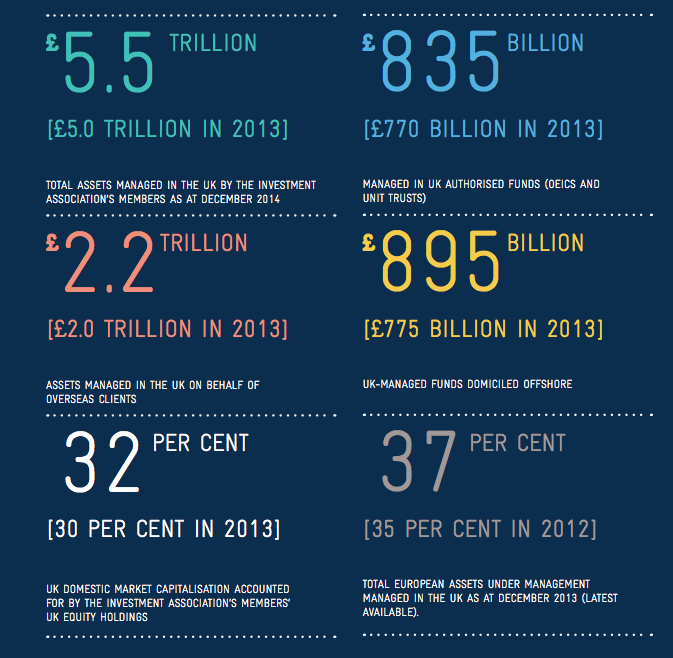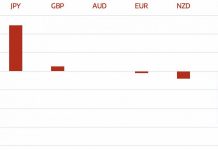
7 Keys Challenges Asset Management Marketers Face!
The Asset Management Industry is still growing and the global wealth and asset management industry faces unprecedented change / disruption in the year ahead. A tightening interest rate environment in the US, the Panama Papers, concerns over deflation in the Eurozone and a recession in many emerging markets comprise the backdrop for an industry part of the overall finance industry transforming itself at a very fast pace. Just in the UK it continues to go from strength to strength, with assets growing significantly faster in the UK than globally in recent years.
The industry is highly global focused, with around 40% of the £5.5 trillion of assets under management in the UK coming from overseas clients. As the industry grows, so does the scrutiny it receives from clients, regulators, policymakers and the media and special all the areas of FinTech and special the advent of the RobotAdviser.
As the industry and all finance industry are undergoing the FinTech baptism asset managers will need to respond appropriately in the coming years as their role in the economy and society continues to expand and somehow being changed. The majority of assets are still actively managed but the debate is intensifying about the relative cost and delivery of active and passive management new processes, special in automation, risk management and technological automisation.

in the UK 2014-2015, The Investment Association Annual Survey
1. New products and the emergence of ETFs and closed-end products.
In the past ten years the ETFs have grabbed more of the market shares directly from the mutual funds. Though many technical arguments exist between the ETFs and Mutual Funds, it would be very irresponsible of any management firm to overlook the reality that has become apparent. The customer wallet is slowly being transferred from the Mutual Funds to the ETFs and these are the people who are the long-term savers of ETF marketers and the ETF are doing a great job in attracting more people like these traditional long-term savers.
2. Asset Management – Talent Retention.
At this moment, the generation of investment managers is almost at an end. Most of the best talent people are scattered away and are taking help from investor’s to create boutique shops and fintech driven asset management robo adviser solutions. This is surely something to worry about for the CEOs of asset management. Considering that this is an industry where talent – people, product class is based on track record, trust and name recognition, this must be the main topic of discussions in the boardroom debate.
3. Asset Management – Distribution Strategy in a new Digitalised World.
There are about hundreds of salesperson at the big firms who sell to bank distributors, advisors, and wholesalers. New digital market places and distribution models are constantly changing as the advisors are asked to demonstrate accountability and data scalability. Customers look forward to the industry manufacturer to provide them with the value product, not just with good performance but with accuracy transparency and openness that traditionally were not provided by the mutual funds before.
4. Asset Management – Cloud base solutions and infrastructure.
Asset management cloud computing infrastructure variants and cloud-based service models using APIs integration and Big data are now the backbones of this industry. But Asset management tech and cloud solutions are still in its early days much more needs to be done to solidify both technology, dashboards and data solutions.
5. Asset Management – Emergence of Robo-Advisors..
You might find something about Robo-advisors in our recent blogs, where we talk about what a truly disruptive force it is to the asset management industry. Nutmeg in the UK and Wealthfront in the US are on their way to get the lion’s share of the Y generation. That is the ultimate gold for an investment industry.
Electronic platforms are achieving notable AUM growth in the past few years. Featuring data online tools and virtual advice fueled by algorithms, these low-cost platforms (offered by both established firms and technology start-ups) very effectively target lower- to middle-income market segments are making this exclusive industry open to more and more investors and making pressure in the industry to adapt and be more agile and scalable.
Sustained AUM growth is on its way with Wealthfront and Betterment becoming big global players, but these automated advisory platforms face an existential challenge and a lot of regulatory challenges. It is still unclear whether rock-bottom pricing can eventually lead to positive and growing operating cash flow, profitability and long-term viability.
6. User Experience, UI, UE, Big data and the IOE touching the Asset Management industry.
The growing importance of user and customer experience, especially on the web and via tablets and smartphones is shifting the industry towards a route focused in data and devices information that the Internet of Everything is driving. Asset Management firms that are not following this will simple disappear as sophisticated investors want the best experience for the assets and real time data with the best user experience and interfaces UI and UE.
7. Cyber Security and Asset Management.
Cyber security touches all the areas of human life nowadays but in asset management is of upmost importance due to the amounts in question and all the both security and privacy subjects it affects. Just look at the Panama Papers to see we are in the inception of a new world where transparency and cyber security will have to work side by side and the asset management industry needs to be in the forefront of this!


Dinis Guarda is an author, academic, influencer, serial entrepreneur and leader in 4IR, AI, Fintech, digital transformation and Blockchain. With over two decades of experience in international business, C level positions and digital transformation, Dinis has worked with new tech, cryptocurrencies, drive ICOs, regulation, compliance, legal international processes, and has created a bank, and been involved in the inception of some of the top 100 digital currencies.
Dinis has created various companies such as Ztudium tech platform a digital and blockchain startup that created the software Blockimpact (sold to Glance Technologies Inc) and founder and publisher of intelligenthq.com, hedgethink.com, fashionabc.org and tradersdna.com. Dinis is also the co-founder of techabc and citiesabc, a digital transformation platform to empower, guide and index cities through 4IR based technologies like blockchain, AI, IoT, etc.
He has been working with the likes of UN / UNITAR, UNESCO, European Space Agency, Davos WEF, Philips, Saxo Bank, Mastercard, Barclays and governments all over the world.
He has been a guest lecturer at Copenhagen Business School, Group INSEEC/Monaco University, where he coordinates executive Masters and MBAs.
As an author, Dinis Guarda published the book 4IR: AI, Blockchain, FinTech, IoT, Reinventing a Nation in 2019. His upcoming book, titled 4IR Magna Carta Cities ABC: A tech AI blockchain 4IR Smart Cities Data Research Charter of Liberties for our humanity is due to be published in 2020.
He is ranked as one of the most influential people in Blockchain in the world by Right Relevance as well as being listed in Cointelegraph’s Top People In Blockchain and Rise Global’s The Artificial Intelligence Power 100. He was also listed as one of the 100 B2B Thought Leaders and Influencers to Follow in 2020 by Thinkers360.










































